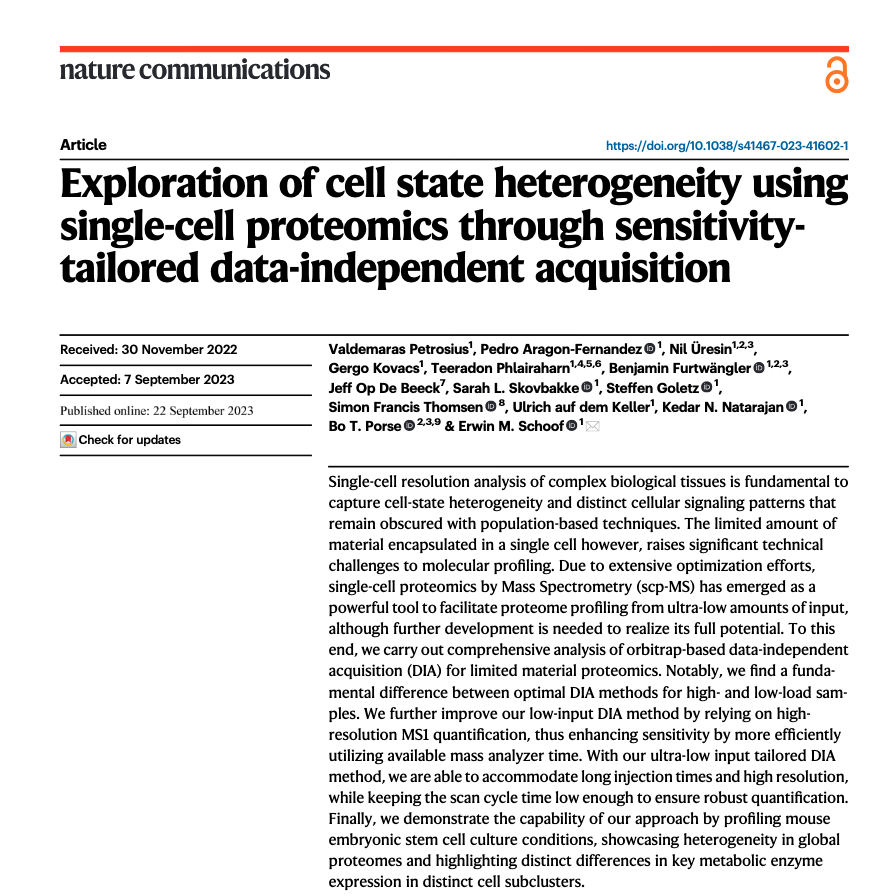The recent publication Exploration of cell state heterogeneity using single-cell proteomics through sensitivity-tailored data-independent acquisition in Nature Communications explores cell state heterogeneity using single-cell proteomics. It discusses the challenges of single-cell proteomics, including the small amount of cellular tissue available.
The team of researchers, led by postdoctoral researchers and Ph.D. students from the Cell Diversity Lab in the Department of Biotechnology and Biomedicine at the Technical University of Denmark and their colleagues, propose a new method for data-independent acquisition (DIA) that is tailored to low-input samples. They show that their method can support the identification of more proteins from low-input samples than previous methods. They also use their method to study the proteomes of mouse embryonic stem cells under different culture conditions.

Figure 1. "Exploration of cell state heterogeneity using single-cell proteomics through sensitivity-tailored data-independent acquisition" in the publication Nature Communications.
Sample Preparation Workflow
The sample preparation workflow would not have been efficiently or accurately carried out without the inclusion of the I.DOT, which dispensed 1 μL of digestion buffer (100 mM TEAB pH 8.5, 1:5000 (v/v) benzonase (Sigma cat. Nr. E1014)) and 1 μL 1% (v/v) trifluoroacetic acid (TFA) (Fig. 2).
 Figure 2. Petrosius, V., Aragon-Fernandez, P., Üresin, N. et al.'s (2023) sample preparation and data collection workflow, which included the FACS Aria III, the I.DOT, the Evosep One, the Eclipse Tribrid Mass Spectrometer.
Figure 2. Petrosius, V., Aragon-Fernandez, P., Üresin, N. et al.'s (2023) sample preparation and data collection workflow, which included the FACS Aria III, the I.DOT, the Evosep One, the Eclipse Tribrid Mass Spectrometer.
Manual pipetting is a time-consuming, error-prone, and expensive task that can compromise data quality. Liquid handling automation offers several benefits that can help researchers streamline their workflows, improve accuracy and precision, and reduce costs.
The I.DOT playing an integral role in this workflow excites us here at DISPENDIX, as it could lead to new insights into cell biology and disease.

Optimize Your Workflow
Are you struggling to optimize your lab workflow? Do you need help choosing the right tools and technologies? If so, we can help!
We offer free workflow consultations to scientific researchers who are looking to improve their efficiency and productivity. Our team will work with you to assess your current workflow and identify areas for improvement. We can also help you to develop and implement a new semi-automated workflow that is tailored to your specific needs. Contact us today!
References
Petrosius, V., Aragon-Fernandez, P., Üresin, N. et al. Exploration of cell state heterogeneity using single-cell proteomics through sensitivity-tailored data-independent acquisition. Nat Commun 14, 5910 (2023). https://doi.org/10.1038/s41467-023-41602-1